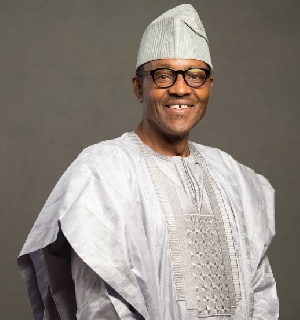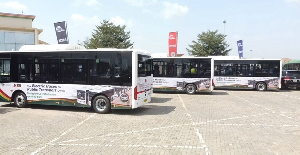Opposition candidate Muhammadu Buhari is close to a stunning victory over Nigerian President Goodluck Jonathan, with just a few areas left to declare.
Gen Buhari, a former military ruler, is ahead by almost three million votes, with results still to come from just five states.
Analysts say it is hard to see how Mr Jonathan can overcome this lead. The opposition has never won a presidential election in Nigeria, Africa's most populous state.
Observers have generally praised the election but there have been allegations of fraud, which could lead to protests and violence.
More than 800 people were killed in protests after Mr Jonathan beat Gen Buhari in the previous election.
Results so far:
Gen Buhari: 13.8m votes;
Passed 25% threshold in 23 states
Mr Jonathan: 10.9m votes;
Passed 25% threshold in 23 states
Results from 28 states + Abuja
Candidates needs 25% in 24 states for first-round victory
BBC Nigeria analyst Jimeh Saleh says that Delta and Edo are the only pro-Jonathan states still to declare, so it is hard to see how he can overtake Gen Buhari.
Earlier, the announcement of results was disrupted when an agent of Mr Jonathan's People's Democratic Party (PDP) launched a tirade against electoral commission (Inec) chairman, Attahiru Jega in Abuja.
"We have lost confidence in what you're doing, we don't believe in you any more," Elder Orubebe said.
Rejecting the allegation, Mr Jega replied: "Let us be careful about what we say or do and let us not dispute a process that has begun peacefully."
The candidate with the most votes will only avoid a run-off if they gain at least 25% of the votes in two-thirds of Nigeria's 36 states.
Gen Buhari has won the two biggest states, Lagos in the south and Kano in the north, while Mr Jonathan won a huge majority in his home state of Bayelsa, as well as Rivers, both in the south.
Gen Buhari's campaign spokesman Garba Shehu told the BBC: "We feel we have won because we have the numbers. We're in celebratory mood but we're not taking anything for granted because of the kind of government we have."
In public the message from both sides is the same - we have won. But behind closed doors there are long faces in the PDP camp.
It looks like Muhammadu Buhari's lead may well prove too wide to be bridged.
Unofficial results from most of the remaining states - published by national newspapers against electoral law - show that even if there are eyebrow-raising turnouts from Mr Jonathan's strongholds in the Niger Delta, he is still in trouble.
But this is Nigeria and predictions are dangerous.
The biggest surprise would be if the result is not disputed by the losing side.
During the vote, the card readers experienced some technical glitches, but they could prove to be decisive in ensuring the numbers could not be cooked and the views of Nigerians could not be ignored.
International observers have broadly praised the conduct of the vote, but there has been some concern over possible efforts to rig the outcome during the count.
The US and UK have expressed their concerns over potential "political interference" during the count.
A spokesman from INEC dismissed these fears, saying that "there is absolutely no basis" to talk of meddling.
Authorities in Rivers State announced a curfew on Monday night after protests over alleged vote rigging.
Mr Jonathan gained a landslide there but Mr Jega said that while the fact-finding team had found some voting irregularities with the poll there, they were not enough "to warrant a cancellation of the election".
Earlier, police in the state used teargas against female opposition protesters who were attempting to lodge complaints with election officials.
Voting spilled into Sunday in some parts of Nigeria after problems were encountered with new electronic card readers, which were introduced to prevent fraud.
President Jonathan, whose PDP has dominated Nigerian politics since 1999, was among those whose registration to vote was delayed by the technology.
Mr Jega said only a fraction of the 150,000 card readers being used nationwide had failed.
General News of Tuesday, 31 March 2015
Source: BBC

















